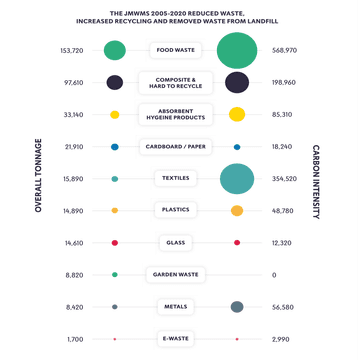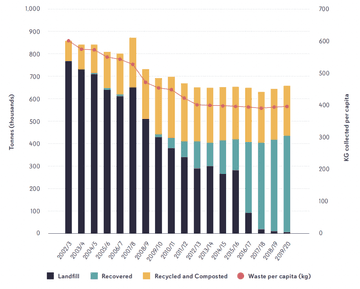Climate Emergency
Our climate is changing faster than we and nature can adapt to. The rising temperatures, caused by burning fossil fuels and releasing carbon pollution, are having an extreme effect on global temperature, biodiversity, ecosystems, and food/water production and have displaced communities worldwide. To tackle the climate emergency, we all need to make changes in our daily lives.
All six of our west London boroughs declared a climate emergency in 2019. In response to this, West London Waste is placing a greater focus on the fight against climate change, setting a target of net-zero emissions by 2030.
Addressing Our Consumption / Circular Economy
Consumption and production of goods may be a driving force of our economy. Still, it relies heavily on using the natural environment and resources such as raw/virgin materials, water, and land.
Sustainable consumption and production, or a ‘circular economy’ is about doing more and better with less. This means we do not need to over-consume to achieve economic growth but focus on increasing resource efficiency and promoting sustainable lifestyles. As opposed to the traditional linear economy, which is based on a take-make-dispose pattern, the circular economy promotes and facilitates the extension of the life of all the materials as long as possible through sharing, leasing, reusing, repairing, refurbishing and recycling and reduces the need to exploit raw and virgin materials which are limited/finite.
West London Waste has started to integrate circular economy principles into our thinking. We are working with partners across the UK such as ReLondon, London Councils and universities to implement more exploratory projects to test how we can support green recovery and a circular economy in west London and reduce waste whilst increasing material recovery.

West London Waste conducts waste composition analysis on a rolling 15-month basis to better understand the waste patterns, seasonality and to identify and prioritise the key areas. From this, we know that food waste makes up the largest proportion of waste in black bags. Food waste also has the largest embodied as a whole. Food production and consumption are responsible for around 30% of global carbon emissions. This is why reducing and recycling food waste is a key priority. We have also been focusing on textiles and absorbent hygiene products (AHP) in recent years as they are also carbon-intense materials. Helping residents to reduce waste and remove as much of them out of black bags, and making the most of what is disposed of are crucial steps toward decarbonising our community.
Food Waste
Food waste makes up the largest percentage of contents in the black bin. Did you know that food production and consumption is responsible for around 30% of global carbon emissions? Agriculture requires space, energy, water, fertiliser, heavy machinery, transporting and packaging, which all contribute to global warming. And yet surprisingly, around a third of all food in the world is wasted.
In 2020, we collected 30,907 tonnes of food waste from 6 west boroughs. Of that, 18,853 tonnes (around 61%) of food waste was avoidable food which means we could have eaten them. That is almost as much as 496 million slices in weight! West London Waste has invested £3 million pounds for food waste infrastructure, which will see more west Londoners being able to recycle their food waste. Flats, flats above shops & commercial properties will be targeted over the next couple of years to increase the capture of food waste & reduce the amount we see in our black bin waste.
Find out how you can reduce food waste here.
Moving up the waste hierarchy
We’ve been successfully reducing the amount of waste sent to landfill over the last 10 years. Landfill as a means of waste disposal pollutes the environment and emits large quantities of greenhouse gas emissions as a byproduct of decay. Therefore, most of your black bins are now sent to the Energy from Waste (EfW) plant to be incinerated. Through incineration, the toxic gases can be captured, and less land is required for landfill, hence protecting our environment. EfW also produces electricity during incineration (hence its name) making the best use of the process we have to deal with waste.

Decarbonising Our Operations
At West London Waste, we are embedding carbon reduction and sustainability into our operation. We’ve so far achieved:
- Switched to renewable gas and electricity at our offices
- Fleet replacement of 2 vans to a single electric powered van
- Reduction of fuel usage for the mobile plant at Abbey Road by optimising usage
- Planting a hedgerow and wildflower meadow to improve biodiversity
- The digitalisation of internal forms and reports to reduce paper/printing usage
What can I do?
Simple changes make a big difference. Switching to renewable energy as we've done can help reduce the carbon impact significantly.
- Read on to see how you can reduce your waste and make greener living
- Think about what you are buying - where are they made, what they are made of, how long will it last, are there better alternatives or can I do without it?
- Use public transport or cycle/walk to travel around - visit TfL website for useful information
- Sign up to a car share scheme to “rent” a car instead of owning a car
- Switch to a renewable energy tariff for gas and electricity - there are many comparison websites which you can use to get the best quotes
- Change your bank(s) to ethical and/or sustainable banks





